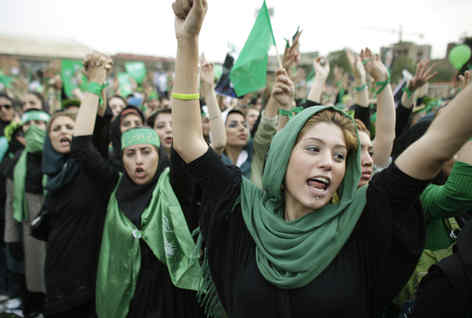
For years, women's defiance in Iran came in carefully planned flashes of hair under their head scarves, in brightly painted fingernails, and in trendy clothing that could be glimpsed under bulky coats and cloaks.
But these small acts of rebellion against the theocratic government have been quickly eclipsed in the wake of the disputed June 12 presidential elections. In their place came images of Iranian women marching alongside men, of their scuffles with burly militiamen, of the sobering footage of a young woman named Neda, blood pouring from her mouth and nose minutes after she was fatally shot.
In a part of the Muslim world where women are often repressed, these images have catapulted female demonstrators to the forefront of Iran's opposition movement.
It is a role, say Iranian women and experts, that few seem willing to give up, and one that is likely to present even greater challenges to President Mahmoud Ahmadinejad's hard-line government in the wake of the recent violence and protests.
"Iranian women are very powerful, and they want their freedom," said one woman in Tehran who said she had been taking part in the protests.
Like all women in Iran interviewed for this story, she did not want to be named, fearing government retribution. But, she said, "they're really, really repressed, and they need to talk about it."
The election seemed to open the floodgates for airing that sense of frustration.
Assertions by Ahmadinejad's chief rival for the presidency, Mir Hossein Mousavi, that the election was riddled with fraud were the catalyst for days of protest. The government's harsh response - evidenced in hundreds of arrests, the deaths of more than a dozen demonstrators, clampdowns on the media, the refusal of Iran's theocratic leaders to entertain the possibility of a recount - fueled popular discontent across wide swaths of the population.
But there is an extra layer of resentment and anger among many of Iran's 35 million women. Many fear that a second term for a man first elected in 2005 in part on a platform of restoring "Islamic values" will only prove worse than the first.
"The root of the current unrest is the people's dissatisfaction and frustration at their plight going back before the election," said Iranian Nobel Peace laureate Shirin Ebadi. "Because women are the most dissatisfied people in society, that is why their presence is more prominent."
But these small acts of rebellion against the theocratic government have been quickly eclipsed in the wake of the disputed June 12 presidential elections. In their place came images of Iranian women marching alongside men, of their scuffles with burly militiamen, of the sobering footage of a young woman named Neda, blood pouring from her mouth and nose minutes after she was fatally shot.
In a part of the Muslim world where women are often repressed, these images have catapulted female demonstrators to the forefront of Iran's opposition movement.
It is a role, say Iranian women and experts, that few seem willing to give up, and one that is likely to present even greater challenges to President Mahmoud Ahmadinejad's hard-line government in the wake of the recent violence and protests.
"Iranian women are very powerful, and they want their freedom," said one woman in Tehran who said she had been taking part in the protests.
Like all women in Iran interviewed for this story, she did not want to be named, fearing government retribution. But, she said, "they're really, really repressed, and they need to talk about it."
The election seemed to open the floodgates for airing that sense of frustration.
Assertions by Ahmadinejad's chief rival for the presidency, Mir Hossein Mousavi, that the election was riddled with fraud were the catalyst for days of protest. The government's harsh response - evidenced in hundreds of arrests, the deaths of more than a dozen demonstrators, clampdowns on the media, the refusal of Iran's theocratic leaders to entertain the possibility of a recount - fueled popular discontent across wide swaths of the population.
But there is an extra layer of resentment and anger among many of Iran's 35 million women. Many fear that a second term for a man first elected in 2005 in part on a platform of restoring "Islamic values" will only prove worse than the first.
"The root of the current unrest is the people's dissatisfaction and frustration at their plight going back before the election," said Iranian Nobel Peace laureate Shirin Ebadi. "Because women are the most dissatisfied people in society, that is why their presence is more prominent."

No comments:
Post a Comment